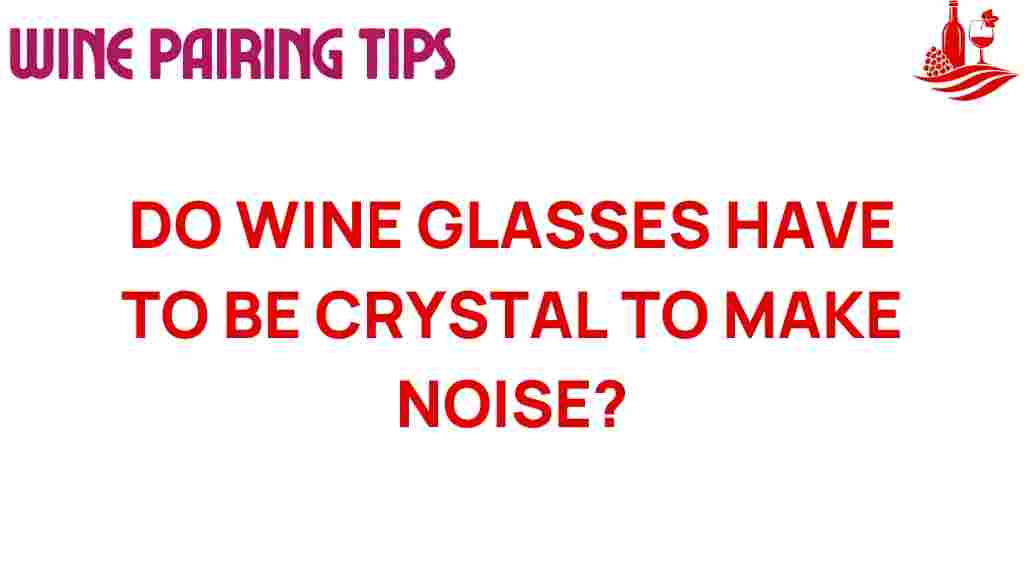The Sound of Elegance: Do Wine Glasses Need to Be Crystal?
When it comes to wine culture, the choice of wine glasses can significantly impact the tasting experience. Among the various options available, crystal wine glasses have long been associated with elegance and sophistication. But do they really enhance the experience compared to other glass types? In this article, we will explore the materials used in wine glasses, the importance of sound and resonance, and whether crystal is truly necessary for a refined tasting experience.
The Allure of Crystal Wine Glasses
Crystal wine glasses are often considered the pinnacle of elegance in the world of wine. Their stunning clarity and brilliance captivate the eyes, while their delicate construction can produce a unique sound that enhances the ambiance of any gathering. Here are some reasons why crystal wine glasses are favored:
- Clarity: Crystal glass is typically leaded or unleaded, offering extraordinary clarity that highlights the color of the wine.
- Weight: The weight of crystal gives it a luxurious feel, making the experience of holding and sipping wine more enjoyable.
- Sound: Crystal glass produces a distinctive resonance when gently tapped, adding an auditory element to the tasting experience.
Understanding the Materials
Wine glasses can be made from various materials, each affecting the taste and experience differently:
- Crystal: Contains lead oxide or other metal oxides, enhancing the glass’s clarity and durability. Crystal glasses often feature a thinner rim, which can enhance the tasting experience.
- Glass: Standard glass is less expensive and more durable than crystal. It can also offer a good tasting experience but may not provide the same level of elegance.
- Acrylic: Often used for outdoor events, acrylic glasses are shatterproof and lightweight, but they do not offer the same resonance or aesthetic appeal as glass or crystal.
How Material Affects the Tasting Experience
The material of a wine glass can significantly influence the tasting experience. Here’s how:
Resonance and Sound
One of the most underrated aspects of wine glasses is their sound. When you tap a crystal glass, it produces a clear, resonant tone that can elevate the moment. The sound is not just for show; it can also enhance the feelings of elegance and celebration:
- Crystal: The high lead content in crystal glass allows it to vibrate and resonate more effectively, producing a harmonious sound.
- Glass: While standard glass can produce a sound, it often lacks the clarity and resonance associated with crystal.
Aesthetics and Presentation
Wine is often about the experience, and presentation plays a crucial role. Crystal wine glasses can add an element of sophistication to any occasion. The way light refracts through the glass can make the wine appear more vibrant, enhancing its visual appeal. This can enhance the overall enjoyment and appreciation of the wine.
Practical Considerations
While crystal glasses are beautiful, they may not always be practical for every occasion:
- Durability: Crystal glasses can be more fragile than standard glass, making them less suitable for casual gatherings.
- Maintenance: Crystal often requires special care to maintain its clarity and prevent cloudiness over time.
- Cost: Crystal wine glasses tend to be more expensive than their glass counterparts, which may not fit every budget.
Step-by-Step Guide to Choosing the Right Wine Glass
Choosing the right wine glass can seem overwhelming, but it doesn’t have to be. Follow these steps to find the perfect glass for your needs:
Step 1: Determine Your Budget
Decide how much you are willing to spend. Remember, you can find quality options in both crystal and standard glass categories.
Step 2: Consider the Occasion
Will you be hosting a formal dinner, or is this for a casual gathering? For formal occasions, crystal may be preferable, while standard glass may suffice for more casual events.
Step 3: Think About the Wine
Different types of wine may benefit from specific glass shapes:
- Red Wine: Look for a glass with a wide bowl to allow the wine to breathe.
- White Wine: A narrower glass helps maintain the wine’s cooler temperature.
- Champagne: Flute glasses enhance the bubbles and aroma.
Step 4: Test the Sound
If possible, gently tap the glass and listen to the sound it produces. A clear, resonant sound can indicate quality craftsmanship.
Troubleshooting Tips for Wine Glass Selection
If you’re unsure about your choice, consider these tips:
- Visit a store where you can physically handle different glass types to see which feels best in your hand.
- Ask for recommendations from wine enthusiasts or sommeliers who can provide insights based on their experiences.
- Read reviews online, focusing on the experiences of others regarding sound, durability, and overall satisfaction.
Conclusion: Is Crystal Necessary?
In conclusion, while crystal wine glasses offer an enhanced visual and auditory experience, they are not strictly necessary for enjoying wine. The choice between crystal and other glass types ultimately depends on personal preference, occasion, and budget. Whether you choose crystal for its elegance and sound or opt for glass for its practicality, what matters most is the enjoyment of the wine and the company you share it with.
For those who appreciate the finer details of wine culture, investing in quality wine glasses—be they crystal or glass—can certainly enhance the overall tasting experience. Explore your options, and find the perfect glass that resonates with your style.
For more insights into wine appreciation and culture, visit this helpful guide. If you’re looking for glassware options, check out this external resource for a comprehensive selection.
This article is in the category Tasting and created by Wine Pairing Tips Team
